New domain ranked #1 on Google within two weeks: Here's my process for finding easy-to-rank keywords
New domain ranked #1 on Google within two weeks: Here's my process for finding easy-to-rank keywords
Right after I bought the domain TopicRanker.com, I decided to make it rank on Google in 2 weeks. I was still building the software platform, so I didn’t have much to put on the website. I created a basic blog and went to work.
Because the blog and the domain were brand new, I was starting out with absolutely no popularity or domain authority. Essentially, Google would have no idea whether my blog was relevant to searchers or not.
It used to be that you could throw up a crappy piece of content on a crappy website and hire some link building agency to build a TON of links to this article it would start ranking. That is not the case anymore, topical depth and user experience of the content has become a bigger ranking factor vs. getting links.
So my goal was to find one keyword search term where the top Google search results had A TON of obvious weaknesses and problems. I found the following term:
Search term: “which keywords are best to target”
Volume: 390/mo
It was relevant to my prospective customer and the top search results had the following problems & weaknesses:
- Top result does not have the exact search term in its title
- Page load of top 3 results is above 3 seconds
- Pages which rank #2 and #4 have only 800 words in the article – too short
- Pages which rank #5 and #6 have poor readability score
These were enough to qualify this keyword for me to go after. Here is what the SERP looked like:
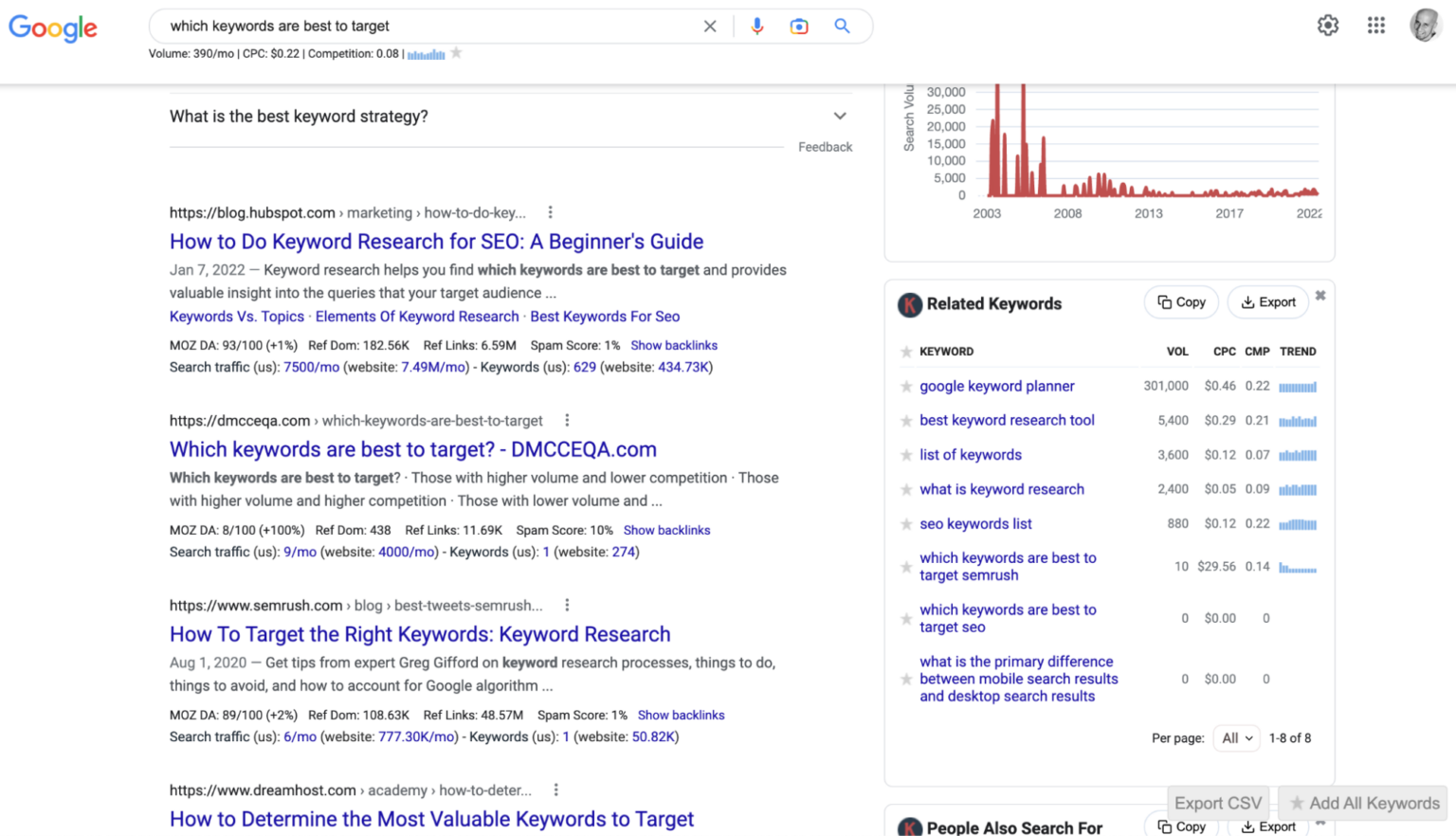
So I wrote my article by targeting the weaknesses above.
- I used the exact search term in my title.
- I made sure my page load was 3 seconds or under.
- I made sure my content was 2K+ words.
- I made sure my article had a readability score of 60+.
Here is the article: Which Keywords Are Best To Target
And…without any backlinks, the article was ranking #1 within a week.

I’ve received 100+ signups from this article alone. Now, I want to teach you to do the same.
Below, I’ll share a step-by-step guide explaining the process I used. Ready? Let’s roll!
What are easy-to-rank keywords?
Easy-to-rank or low-competition keywords are the keywords that, because of several factors, will be easiest for you to create content that will rank higher on the SERPs. Often, these keywords are low-hanging fruit that has been neglected by your competitors and therefore have weaknesses and problems on search results. When you’re starting out, these are the keywords that will give you the best opportunity to generate organic traffic.
Some of the factors that decide keyword difficulty include:
- Weaknesses & Problems on SERP: We went over this a little bit already above, if there are problems on the google search results it’s an indication that this might be a good search term to go after. I'll list more possibilities in the next section.
- Relevance: Google prioritizes content that meets the searcher’s needs. The top results will be what Google considers the best resources out there for that query. This means you need to consider search intent (the reason why the searcher is looking up that term). With that in mind, you can create effective, useful content that fulfills their needs.
- Authority: Google gives more weight to authoritative sources. To be deemed authoritative, you should have a wealth of helpful content replete with social signals and backlinks from other highly ranked websites. If the competitors for the keyword are highly reputable sources like Forbes, you’ll have a harder time ranking for that keyword.
- Volume: Measured by monthly search volume (MSV), this is the number of times a keyword is searched for every month. There’s no point ranking for a keyword that no one searches for. But if a keyword has a huge MSV, chances are the competition is extremely high.
Beyond this, you can exploit flaws in the top search results to find easy-to-rank keywords. For example, some of the top results may have low word counts, are not optimized for mobile devices, take a long time to load, or are missing key terms in their headlines.
These weaknesses are opportunities for you to easily rank your articles by creating stronger content. Below, we’ll explain how.
How to find easy-to-rank keywords
In the next section, we’ll break down how you can identify easy-to-rank keywords in six steps. You’ll start by brainstorming a broad list of topics and keywords, then narrow this list down gradually by analyzing the competition for weaknesses.
Below are the steps you can take to find and qualify a keyword:
Step 1: Come up with a list of potential topics
To start this process, think broadly about general topics that you want to or could rank for. These topics should be related to your website and should stem from your core expertise.
Once you have a list of topics, generate an exhaustive list of keywords that fall under those topics. These are the specific terms that are important because your target customers are probably searching for them.
For example, if you run a business texting software platform company such as SalesMessage (one of our customers at TopicRanker), then you would brainstorm a series of topic phrases that people would search for relating to business texts, like:
- Sample SMS text messages to customers
- How to text customers to show up to a call
- How does sms texting work for businesses
Don’t worry too much about the quality and type of topic at this stage. We’ll narrow them down to the most effective terms during the next steps.
Also, aim for a list of both head terms (like” business texting”) and long-tail keywords (much more specific phrases, like “Sample SMS text messages to customers”). You’ll end up targeting more long-tail keywords as these are less competitive and easier to rank for.
There are several free and paid tools that can help brainstorm topics for your content generation strategy.
Here are a few tools that can help:
- TopicRanker: TopicRanker shows you keywords you can rank for easily based on problems & weaknesses in the search results. Here is how it works: It crawls your site to determine general topics you’re a topical authority in. Then it scans millions of Google search results and recommends the exact keyword phrase which is on topic with your site content and has multiple key weaknesses. And from that data, it recommends current content on your site that should be updated, as well as new content that should be written. Here is how I use TopicRanker to find a keyword for our customer, SalesMessage.
- KeywordsEverywhere: A freemium browser extension that can show you related keywords, phrases people also search for, trending keywords, and long-tail keywords relating to any Google SERP or webpage.
- Ahrefs: A nice brainstorming tool to discover keyword ideas by plugging in your seed phrase. For each keyword, Ahrefs will provide a stack of SEO metrics to help you choose which are best to go with.

- Exploding Topics: This tool analyzes searches, conversations, and mentions to find trends and market opportunities. You can use these insights to inform which keywords you should target.
With a preliminary list in hand, it’s a good idea to set up a basic spreadsheet. As you move through the article, you can add notes and assess each keyword at the end.
Step 2: Look for weaknesses in the SERPs
Another key factor to consider when doing keyword research is the quality of the competition on Google. If you’ve found a keyword that you could rank for, the next step is to analyze the competition for a range of weaknesses that will make it easier for you to rank.
These weaknesses include:
- Domain authority: As mentioned above, if you find that the top 10 spots on Google have a lower Moz DA than yours, there’s a good chance you will outrank them for that keyword. Take a look at the example for OutplayHQ.com with Moz DA 34 below, you can see that the article ranking #2 is Moz DA 35, which is a strong signal that OutplayHQ can outrank them if they create something better.
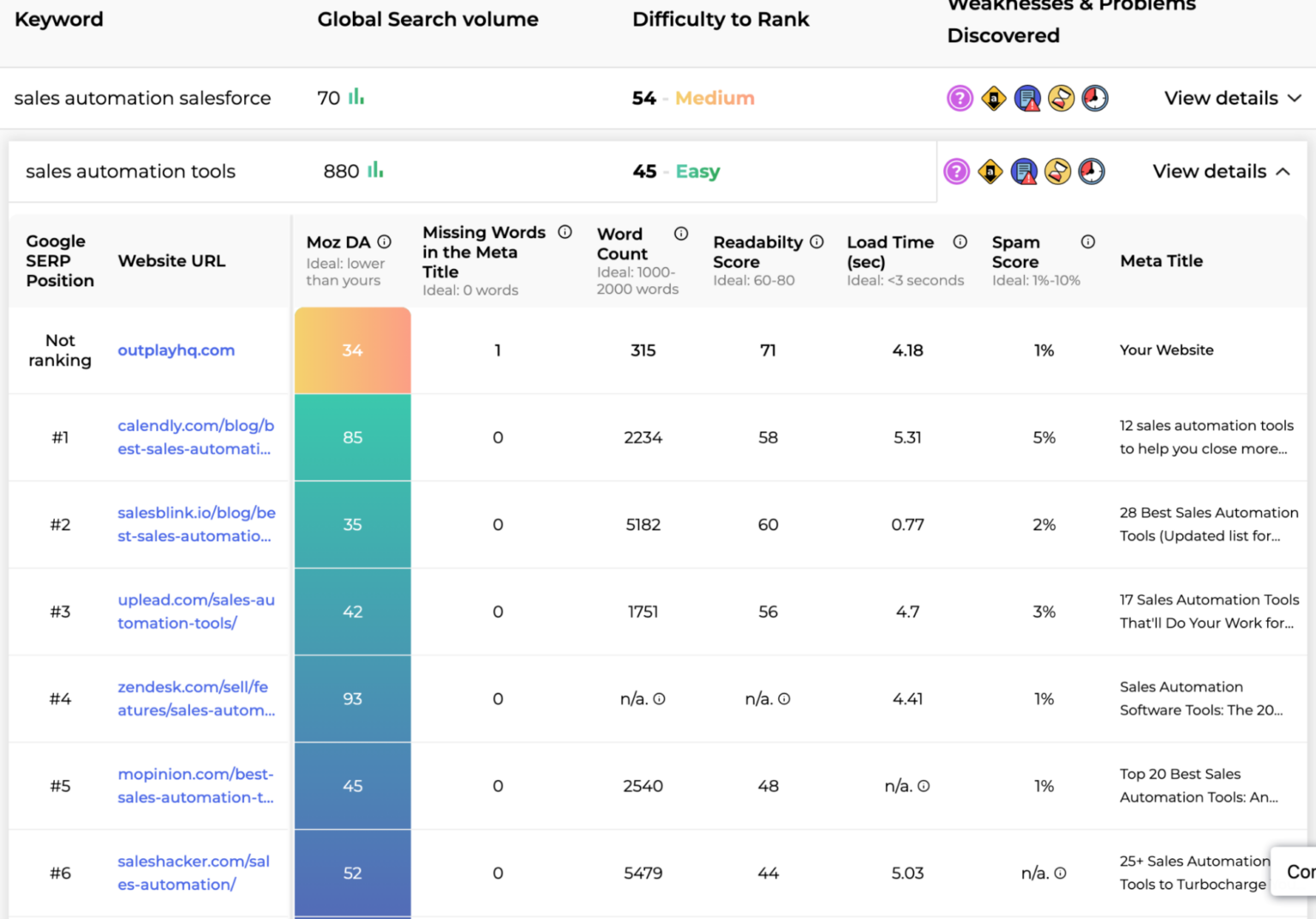
- Title mismatches: This is when there are words missing from the meta title that are included in the search query. Ideally, there should be none missing. For example, when you search “fixed money supply”, the first result doesn’t have this phrase in the title at all. This has a serious impact on SEO as readers are likely to skim over it.
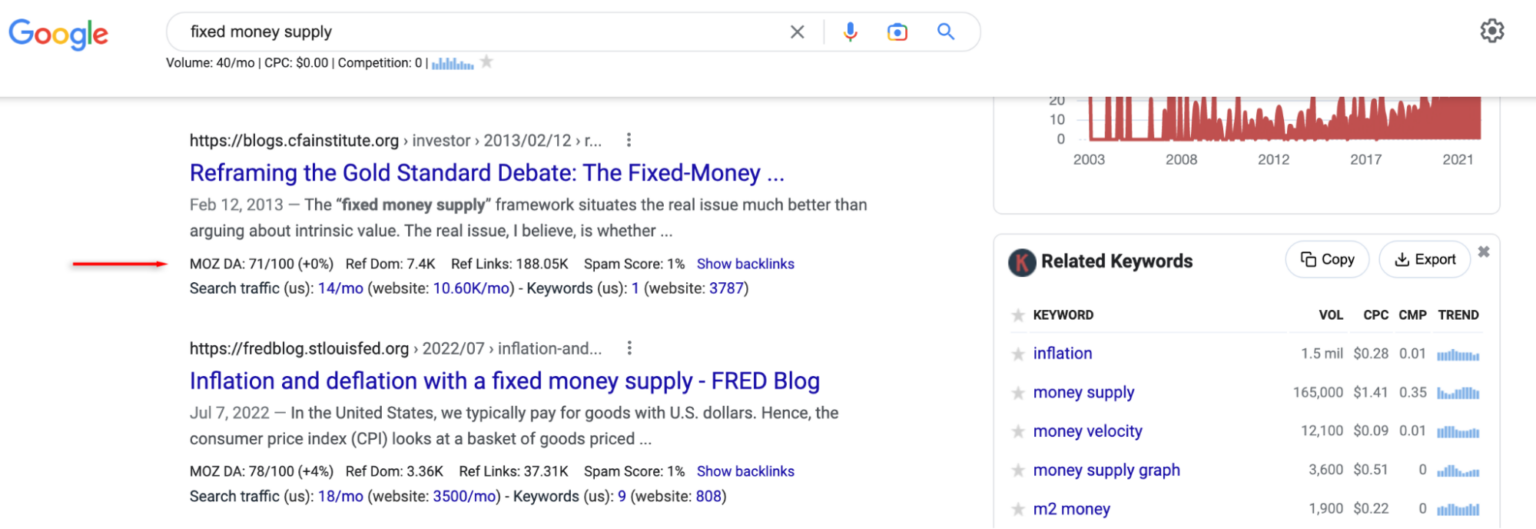
- Low word counts: The word count of your article should be between 1,000 and 2,000 words to be competitive. A low word count on the ranking articles is a sign that they are thin in content and could be improved.
- Readability: Content should be written at a 7th to 9th-grade reading level, which corresponds to a Flesch Reading Ease Score of 60 to 80. A reading level of 10th grade or over (or a Flesch score of under 60) is challenging for most online readers. You can capitalize on this weakness with an article that’s well-written and easier to read.
- Load times: According to Google, the load time of a web page should be under 3 seconds. If the top articles for your keyword show load times higher than this, you can outrank them by producing a faster-to-load page.
- Spam scores: You can use SEO tools to determine the spam scores for the pages in the top 10 results. If they have spam scores of over 10%, you have a chance to rank by developing better content that’s less spammy and more informative.
- Article age: You need to have current content, meaning 6 months or less. If it’s older than 6 months, it’s time to update it! I try to update all my content every 2 months.
- Forum sites: Google hates ranking Quora, Twitter, Facebook, Medium, LinkedIn, etc. on the first page for informational searches where people are looking for articles. If you see one of these on the first page of Google, it’s a dead giveaway that Google is starved for content.
- Mobile compatibility: Google prioritizes this a great deal, if your site loads slowly on mobile Google will penalize you, so make sure your site loads fast on mobile. You can test your site here
You can also use a dedicated keyword research tool like TopicRanker to determine problems in the Google search results.
Your goal is to find keywords that have a few of these weaknesses. They don’t have to have every weakness, but the more there are, the easier it’ll be to rank for that phrase.
If you learn better from visuals, here is a worksheet to use when thinking about weaknesses:
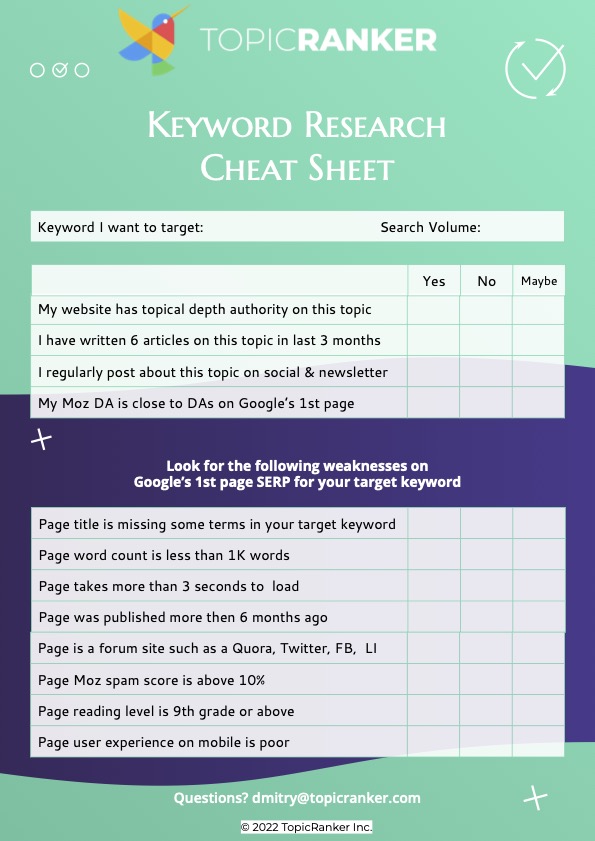
Here is a quick example: I ran TopicRanker on nextiva.com/blog for one of our customers and found that the this article on Dialpad Alternatives needed a bit of improvement since it ranked in position #18 (bottom of page 2) of Google. It had the following weaknesses:
- Outdated content: The content was from 8 months ago.
- Low word count: It was under 1500 words.
- Poor readability score: The score showed it was hard to read.
I had the team at Nextiva improve these action items and the article jumped to the #3 spot.
Step 3: Remove topics that aren’t related to your domain authority
Remember how Google determines ranking based on relevance? It’s time to take that into consideration and narrow down your keywords based on whether they fit your domain authority.
The more you post great content about a general topic (for example, SEO), the more likely Google is to see your website as an authoritative source in that context.
Ask yourself the following questions:
- Does my website have topical depth authority on this general topic?
- Have I written at least 6 articles on this topic in the last 3 months?
- Do I regularly post about this topic on social media and via my newsletter?
If you answer no to any of these questions, you’ll have a much harder time ranking for them – especially if the top 10 results are highly authoritative. So, remove any keywords for which you answered no to all three questions.
Step 4: Check the monthly search volume (MSV)
The next thing to do is check how popular the search term is. You don’t want to target a keyword that nobody is searching for. However, high-volume keywords are often difficult to rank for as they are broader and usually very competitive.
Instead, target keywords that have 50 to 500 people searching for them per month. At this level, you have a good chance of ranking.
Using Keywords Everywhere, you can easily get search volume and traffic estimates for the search terms you’re considering.

You can also easily check search volumes using TopicRanker:
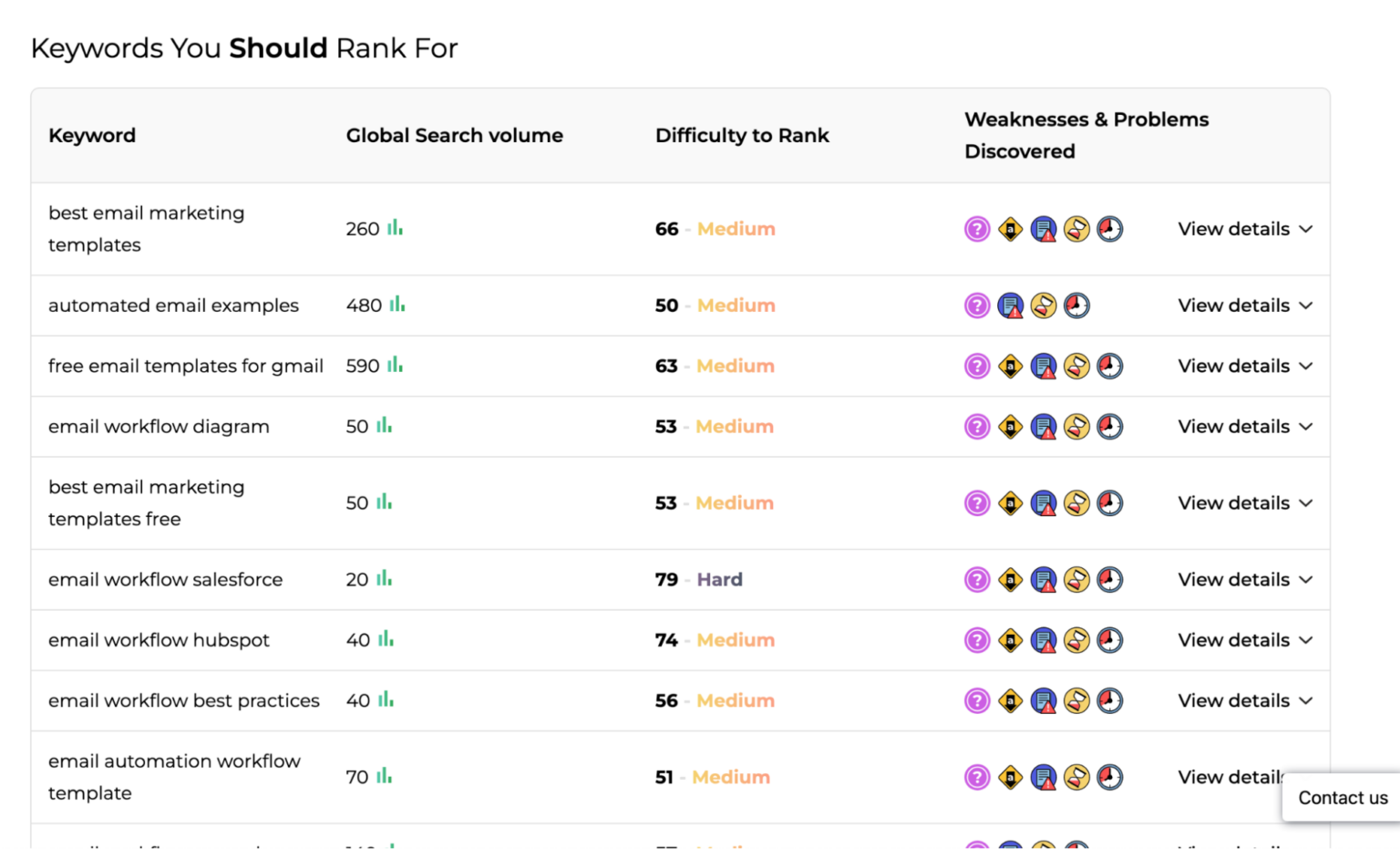
Add these volumes to your spreadsheet and flag the terms that have too little or far too much traffic. You’ll probably cut these from your list before moving to the next step, but there’s one last thing to check.
There’s one exception to the rule of not targeting very low-volume keywords. In the Keywords Everywhere plug-in, you’ll see the “Trend” column. This shows you whether the searches for that keywords are increasing, falling, or staying the same.
If you see any that are projected to rise in popularity, it could be a good idea to target them before they get competitive. That way, you’ll have ranked for the term before they become higher in difficulty.
Step 5: Analyze the competition
With a narrowed-down list of keywords and a good idea of search volume, it’s time to check out the competition. You’ll want to assess both the amount and strength of the competition, as both of these factors can affect how difficult it is to rank for a keyword.
The first thing to check is how your Moz Domain Authority (DA) compares to the DAs in the search results for each keyword. Moz DA is a metric that measures the popularity and authority of a website, based on factors like the number and strength of backlinks.
The Moz DA ranges from 0-100, with a higher score indicating a higher authority (and a higher chance of ranking). You can easily qualify your Moz DA by using TopicRanker. Simply plug in your keyword, and it will show you how your website’s Moz DA compares to the SERPs for that term:
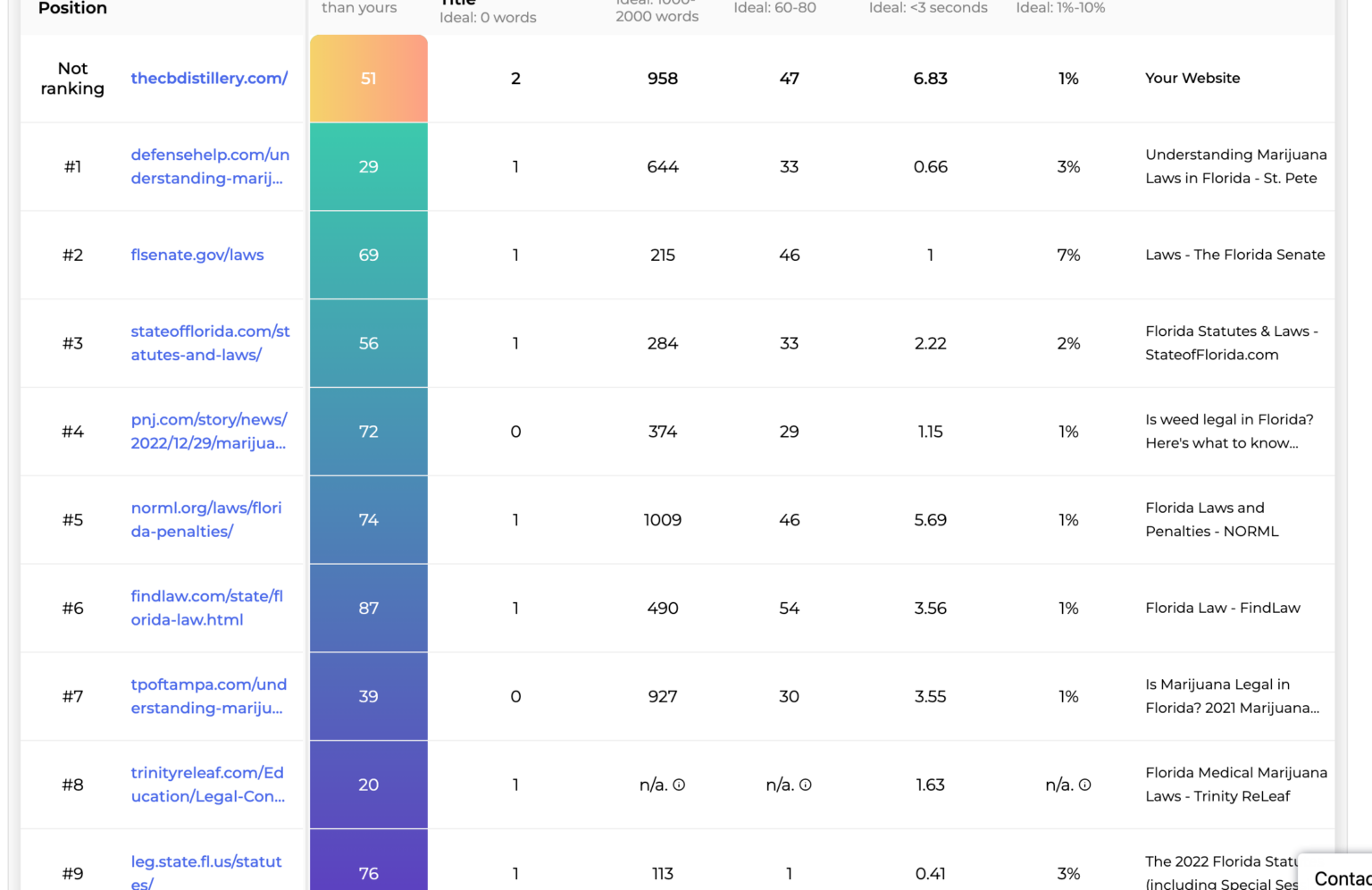
The Keywords Everywhere add-on also shows Moz DA:
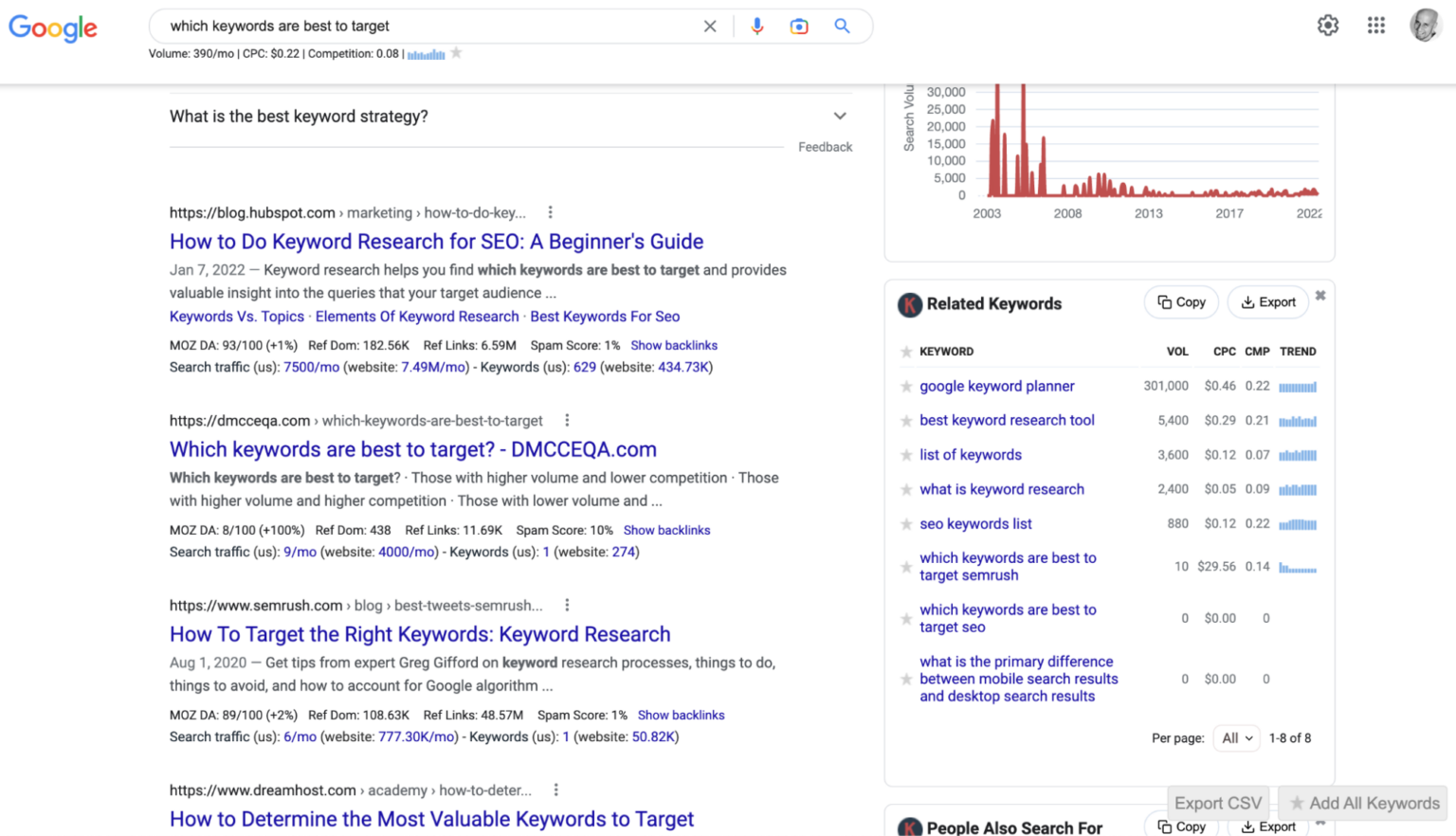
When judging whether a keyword will be easy to rank for, compare your Moz DA to that of the websites on Google’s first page. If your result is close to the average Moz DA of the top ten results, you have a decent chance of ranking for that keyword.
Next, take into account the quantity of competition. If the first two results on Google are particularly strong, but the quality drops off significantly after that, then you have a chance of ranking. However, if there are dozens of high-quality articles with strong Moz DAs, that keyword is likely going to be too difficult.
Step 6: Consider user intent and finalize your list of keywords
By now, you should hopefully have found easy-to-rank keywords that:
- Satisfy the conditions about topical depth authority and regular posting.
- Have a monthly search volume between 50 and 500 (or lower if they’re trending upward).
- Have 2-3 (or more) of the weaknesses listed above.
However, to rank for them, you still need to generate useful content that outperforms the competition. This means you need to take into consideration the user intent behind the search queries.
Not only can this guide your approach to content creation, but it can be a final step in assessing weaknesses in the SERPs.
Google’s job is to answer people’s searches with contextually relevant articles, based on clues in their search queries. If the content in the top search results doesn’t match the user intent, you have an opportunity to fill the gap and provide the content that those people are looking for.
To assess user intent, ask yourself the following questions:
- Who’s searching for the keyword? Are the search results targeted at experts rather than beginners? Is there a mismatch where the top content isn’t meeting user needs?
- What are they looking for? Do they want to buy a product or service, find information, or navigate to a specific web page?
- What angle are the top results taking? Is there an opportunity to fill a gap that hasn’t been addressed yet?
Once you’ve answered these questions, you should have a decent idea of the kind of content that’ll stand out and meet the needs of your visitors.
Time to start creating
Targeting low-competition keywords is a great way for less-established websites to get their foot in the door and land a place in the top search results. Every article you rank means more site credibility, more ranking articles, and more conversions.
With a list of easy-to-rank keywords and a vision of the content you need to create, there’s nothing left to do but write. So it’s time to get started!

I've been focussed on improving the SEO for T.LY URL Shortener. It's a challenging market because most of the competition has been around for 20+ years.
I've found that following all the standard advice works, but it takes time.
Currently, for the search term "URL Shortener," Im ranking around the five spot. I would love to see this move to the top 3. If anyone has advice, I would love to hear it.
Sure thing. So first of all the term "url shortener" gets 640,000 searches per month, and that's just that exact term, nevermind all the off shoot terms. So you're going after a VERY competitive term and you're fighting competitors which have been there for years.
Your strategy needs to be slow, step by step. Start ranking for all the different subtopics of your main topic and build it up.
In other words - "url shortener" is your hail mary. The ultimate goal. But to rank for that you need to rank for all the other small terms under it.
For example, google "hearing aids" - towards the bottom of 1st page of Google you'll see this page - https://www.healthyhearing.com/help/hearing-aids
Now this is a HUGE term for them, but they did not start ranking for it just because they have "great content" - they rank for it because they have most comprehensive library of subtopics out there - check out there "help section" - help menu in the right. See that?
Your job is to become the topical authority in your field! So you need to do keyword research for other keywords related to different topic clusters of subtopics for "url shortener".
Does this make sense?
We help our customers at TopicRanker with this all day long. Ping us direct if you have more questions.
This is the right answer that I also believe works 99.9% of the time! Create a small sets of islands of subtopics around your big island to rise in the ranks!
So interesting and helpful, thanks
Very interesting article, I'm going to test it soon!
Nice write up! Made me super curious to dive into this further.
This is amazing! I’ve built a QR code generator and used to believe that as long as the product was good, I’d naturally attract a lot of users. So, I’ve spent the past year focusing on improving my website’s features. But now, the competition in this field is so intense, and my site barely has any users. This article has been incredibly helpful, and the comments below are fantastic as well. I’m going to start using these strategies to drive traffic. Thank you all so much!
I just started learning SEO from scratch and I feel it's a particularly good systematic article. I've bookmarked it for repeated reading.
Great, very useful article, need to read it several times and learn more
Thanks for this Dmitry, this is a fantastic resource!
Thanks for sharing, helps a lot on me
What! This is so awesome. I've been working on our product ConveyThis. Gonna go give it a shot. Thanks dude!
I am learning to SEO and your post is an excellent guide. Loved it. Thanks for writing this.
Nice and very informative article. We will definitely try this. What are the paid tools that you've used? keywords everywhere? ahrefs?
Noted, fire post!
This is very helpful. I've created an account at TopicRanker for my new webshop: Fantasy-art,nl. The report looks good.
As a SEO newbie I need to make more time to look more into this, but I will do so soon.
Cheers! Thanks for giving us a try. Happy to help if you have any questions.
it's very helpful full tips for me that those use in your blog.
Super detailed! Thanks for penning it down.
Bookmarked , this is very useful
This is freaking awesome. Excited to try this out
That's very good.
I also want to rank my site. Any sugesstions.
what's your site?
Wow this is insanely helpful. I had no idea that google rank could be built in such an insanely short time. Very impressive
To find easy ranking keywords for a website, there are several methods that can be used. One approach is to use keyword research tools, such as Google Keyword Planner, Ahrefs, SEMrush, or Moz Keyword Explorer. These tools can help identify relevant keywords with low competition and high search volume. By finding these types of keywords, it can be easier to rank higher in search results.
Another method is to analyze your competitors. Look at the keywords your competitors are using and identify any low-competition keywords that you could target. This technique is called reverse engineering. By doing this, you can gain insights into the keywords that are working for them, and use that information to improve your own keyword strategy. Personally, i have ranked my gaming site on theStumbleguys using these methods
However, by using these methods, you can increase your chances of identifying keywords that will help your website rank higher in search results, ultimately driving more traffic and potential customers to your site.
Competitor analysis is a nice practice, I would however couple it with SERP weakness analysis and focus more on the issues and troubles on the SERP you are going after. If there are no problems with it - why try to rank for it?
So interesting and helpful, thanks
@dmitryprdude really like your site TopicRanker. Have you thought of increasing the number of keyword suggestions returned for your paid plan? 6 suggestions is a ridiculously low number to me. I'd sign up if it was at least 25-50
Cool! I am using pretty much similar method with the help of tools like keyword everywhere, semrush, moz etc
if you would like to supercharge this method i know a few search operators that will change the game if you add them to your method. all i require as payment is a backlink from the new site :)
Good tactics and intelligent move to keep up your SERP ranking in short period of time
WAO AMAZING TIPS
Very thoughtful and really good insights. I still feel that DA and Ur play important and link building is critical.
@dmitryprdude Amazing to hear your perspective and learn from your insights. Thank you Dmitry.
This is a very inspiring article and very helpful. I do have a question though: did you already have content on the website or was this your first article? Just curious about the work that preceded the explosion in traffic.
This was my first piece of content.
Thank you Dimitry for such an interesting and useful article. I'm a newbie to SEO. This definitely gave me a good understanding and directions to take for further research on the topic.
happy to help!
Gold article, thanks !
Regarding backlinks from authoritative sources, an idea might be to launch your project on producthunt/hackernews which have the particularity of being themselves authoritative sources.
Thanks for kind words.
Sure, backlinks from anywhere are great. You do eventually want backlinks from real domains, not forums/etc. A bit more on this here:
https://moz.com/blog/case-study-ranking-high-volume-keyword
Super detailed - thanks!
Is it good to use AI based content on a new blog as there are too many AI based content generating tool available online. I am planning to make a new website and I need to know this.
good question, so I would use AI generated content for an outline or a first draft, but then I would edit it and improve heavily, I would never take what ChatGPT creates and publish it on my blog word for word. I'd always use it as a first draft.
Please read/watch this - https://ahrefs.com/blog/chatgpt-for-seo/
Yes, it's totally fine as long as it's high quality. The more value and unique perspective you can add to the existing topic the higher your chances are for that content to rank highly. I would encourage you to check out some topics in content authority and relevancy like "information gain" and "topical authority" so you can see why AI content itself is not bad. There should be a point soon (maybe already here) that AI content will be much better than human-generated content as far as informational keywords go.
Great article and advice, Dmitry! TopicRanker looks super helpful.
As far as keyword research and really understanding topical authority for your target keyword, I would suggest running a content audit of the top 10 ranking pages in Google to figure out which subtopics they cover and which ones they're missing. This will help you build the ultimate page and make sure you rank higher on the first page.
I created a tool that does this automatically for any target keyword and then allows you to use chatGPT to build the ultimate piece of content.
Here's a screenshot of the topical report inside the tool:
I'd love to give anyone here access. Please join the waitlist on my site at
https://ousia.ai
Another good chrome extension to use is the MozBarchrome extension to help you find the MozDA of a website you're currently viewing
Very helpful article thanks. Keep up the good work.
Great content
Very comprehensive. The insight that Google is starving for content where forums like Quora are raking on page 1, is something completely new and useful to me. I am gonna give it a try soon. Thanks Dmitry.
100%! Google hates to put forum websites or social media sites on 1st page of results. Nice little trick to keep in mind.
Great article, Dmitry! Loved the captivating storytelling approach to explain the process of finding easy-to-rank keywords.
Great article! I can relate to it as I am currently implementing a similar approach with my side project. But it took almost a year in my case to start ranking.
Google takes a while to change it's mind and can be stubborn about certain serps! Patience is key with SEO.
Wow! This is a masterpiece Dmitry.
I started out ibiangake.com 3 months ago and haven't made any headway. Glad I found this.
I'll definitely implement to see the outcome.
Sounds good! And ping us over at topicranker.com as you start to implement this stuff, happy to give more feedback.
Wow, great article. I love the step by step approach. Thanks for sharing
You have shared a great strategy to target the right keywords in the right way! We have implemented a similar strategy in the past and obtained most of our sign-ups for our SaaS tool from the article we shared on multiple platforms. We will now follow these steps again to find the right keywords for our product.
Thanks! What's your site?
That‘s some really great advice, thanks! You really shouldn‘t underestimate the power of SEO
Great tips!! It really helped me on what I'm working on!
cheers! happy to help
Remarkable learning! Thank you for sharing.
What was your DA when your ranked for this world?
I believe it was Moz DA 7 or 5 or so
So you already have a lot of work done to reach that DA before all of a sudden you ranked first for a certain keyword with brand new domain, isn't that right? With brand new domain and 0 DA I doubt you can rank first anywhere? Am I right?
Not really, when I started writing the article my Moz DA was 1 and aftter I ranked my moz da went to 5.
I did not do much work before to get to 1, just promoted it on LinkedIn with some valuable content/ posts.
So I can build up my DA just by finding unique keyword with some decent MSV and writing an article for it with good readability score targeting the search intent, which will tell Google to rank me first and my DA will go up?
Here is a good article on how to grow your DA: https://moz.com/blog/how-do-i-improve-my-domain-authority
This was tremendously helpful, thank you for sharing such quality content
happy to share, don't be a stranger as you implement, if you have question - ping me - just hit contact on topicranker.com
Thanks a ton for this valuable post, Dmitry.
happy to share, and don't be a stranger as you implement some of these steps on your own, contact me with questions, just hit the contact envelope on TopicRanker.com
Hey Dmitry, thank you for writing such an in-depth guide.
Would you mind listing the SEO tools that you are using? Preferably free but also paid ones.
Sure thing! I use TopicRanker of course and KeywordsEverywhere extension for keyword research, MarketMuse to optimize, SE Rankings to track rankings, Ahrefs and Moz to check on other websites health/popularity. That's about it!
Thanks for posting this amazingly informative article!
I often hesitated on choosing the blog engine. I know Wordpress is good. But I really don't want to deal with it.
Do you have any recommendation on where to host the blog that's friendly to both search engines and the blog owner?
Sure thing. I use Wordpress and I LOVE getflywheel.com - their support is unmatched. Been with them for a while. Even after the acquisition they rock.
You might want to look into webflow. It's intuitive for programmers, basically a visual coding interface. Though it'll have a bit of a learning curve, you can do a lot more with it.
If you're not in it for that since you seem to just want to run a blog, then try wix or square space.
Wordpress is definitely simple when you use page builders like elementor.
The search engine doesn't really care where the site is being hosted or what platform it had been built on, rather the actual content is much more important
Thanks, @sunnysideup! I know the content is king here but I just don't want other minor technicalities hindering the content taking full effect.
This was really helpful and informative. Thank you !
Trying this asap.
happy to share! stay in touch as you implement this stuff, just hit the contact link on TopicRanker.com
This is gold. How can TopicRanker help a brand new site? or an Old site which has next to zero content on the business topic ? I have both of these cases to deal with at the moment and reading your post is giving me ideas.
Sure thing. So for an old site our tool crawls your site to figure out your topic depth authority the way Google sees it- that is - which topics have you written a lot about and which topic clusters you're the strongest at. From there we determine overall seed topics you should write about.
Then we look for problems on search results about specific keyword queries related to these topical depth topics about your site and show you the SERPs which have problems and are on topic with your expertise. We show you specific problems the SERP has.
We recommend keywords to target for new keywords as well as updates you need to make on your old content.
For a brand new site we - since you do not have much popularity, we take your site popularity into account when determining a keyword you should go after. Wo we crawl millions of search results on topic of your new site to find ones where competition is low, popularity of sites ranking is similar to yours, topic relevancy is high, and there are obvious problems you can capitalize on by creating new content.
You can watch the video demo here: https://www.youtube.com/watch?v=yLlqWY6Go6c
Let me know if you have more questions.
What if the old site has next to zero content (most of it is images without alt text conveying product features) and very less text? Is it better to treat it as a new site?
Basically yes, treat it like a brand new site as far as topical depth authority is concerned.
amazing info
It's a good thing that Google indexed your page faster which is not the case in most of times.
You can always submit through Google Search Console and check if there are any errors
Amazing article! Really helpful and well structured. Planning to use this and parts of the strategy for my own tool :)
Sounds good! Looks like you'd in crypto niche?
Good work! I wonder how SEO will change with the new updates to Google search coming out soon
It's always changing! Every single day.
This is a goldmine. Bookmarking it and will test it out soon.
Thanks. Feel free to ping our team at TopicRanker with any questions as you start to implement this stuff, just hit the contact envelope in lower right hang corner.
Huh, maybe SEO isn't dead after all! 😂
It certainly not. It's just harder to rank #1 these days.
@dmitryprdude whoa that's an impressive result — kudos!
What do you think is the lowest search volume that's still worthwhile?
Hey Toni, I'd say if you think there is demand and volume for a specific term in near future - you should go after it. The best ones are where the volume is 0 so nobody is going after it and you decide to bet on it because you know there is going to be more demand in search for that term. And then in 3 months the volume is 500/mo and then in another 3 months it's 1000/mo. Does this make sense?
I'll be adding this to my strategy
Sounds good Edmond! Any question - just holler!
This comment was deleted 3 years ago.